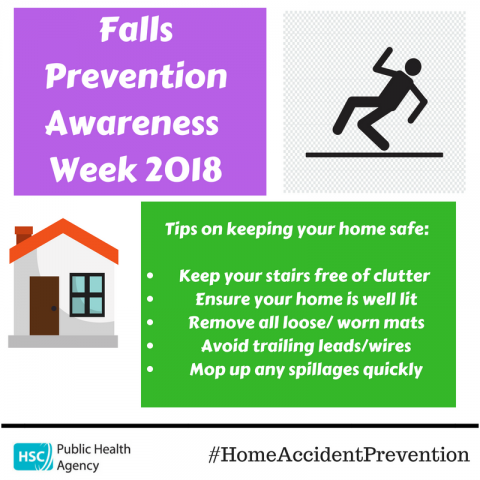PHA encourages action to prevent falls at home

With one in five over 55s having had a fall at home, the Public Health Agency (PHA) is working in partnership with councils across Northern Ireland during Falls Prevention Awareness Week to raise awareness of the measures we can take at home to prevent falls.
Hilary Johnston, Health and Social Wellbeing Improvement Manager with the PHA, said: “Falls can have a very serious impact, resulting in pain and injury, and in some cases even death. Falls continue to be the leading cause of accidental deaths at home with the incidence of falling increasing as people get older. The Health Survey Northern Ireland 2013/14 shows one in five respondents aged over 55 years reported having had a fall in or around their home in the last two years. The human cost of falling includes distress, pain, injury, loss of confidence, loss of independence, and mortality. Many older people also live in fear that they could fall, and this loss of confidence can significantly impact on their ability to remain independent. Falling also affects the family members and carers of people who fall.”
Hilary said that incorporating small changes into your everyday routine can be really beneficial in preventing an accident at home.
”We can decrease the risk of falling in the home by taking some protective measures such as removing hazards that could cause a trip. Exercise and physical activity – activities that improve muscle strength in our legs, arms, back, shoulders and chest – are also particularly important as we get older and can reduce the risk of falling,” added Hilary.
Steps you can take you can take to help prevent a fall in the home include:
• Keep your stairs free of clutter – do not leave items lying on the stairs that could cause a trip or fall;
• Ensure your home is well lit (use high wattage low energy light bulbs) and always put lights on at night, especially when getting up during the night;
• Remove all loose/ worn mats;
• Avoid trailing leads/ wires.
• If you use slip resistant mats in the bath and shower, ensure they are used appropriately, removing them after use to air dry and cleaning the soap suds that can build up and cause a slip;
• Mop up any water/ spillages as soon as possible,
• Have broken or uneven pathways outdoors repaired.
Your home can be adapted or equipment provided in order to minimise your risk of falling. You can be referred to an Occupational Therapist who can assess your needs and potential safety risks in the home. For social housing tenants you can obtain additional lighting, stair rails and other minor adaptations directly from your housing provider. For more information contact the Home Safety Officer at your local council.
A number of simple checks can also be carried out to reduce the risk:
• Check your eyesight – good vision has a major role in how you maintain your balance. Eye tests are free for everyone over the age of 60;
• Look after your feet – as you get older, the size and shape of your feet may change so always have your feet measured when buying new shoes. Choose footwear that has a back with a strap, velcro or preferably laces to secure them tightly. Avoid high heels and slip-ons;
• Bone health – osteoporosis is known as the silent illness and results in more fragile bones that will break more easily, often as a result of a fall. There are a number of risk factors that can increase your likelihood of developing osteoporosis such as family history, smoking, drinking alcohol, long term immobility, early menopause, previously fractured bones and certain medical conditions. If you think you might be at risk of this condition you should contact your GP;
• Exercise and physical activity – activities that improve muscle strength in our legs, arms, back, shoulders and chest are particularly important as we get older. They can make it easier to get up out of a chair, and improve our posture, co-ordination and balance which reduces our risk of falling. Exercise must be performed at least three times a week for effective falls prevention.
1 in 5 respondents (19%) aged 55+ years reported having had a fall in or around their home in the last 2 years. Source: Department of Health, Social Services and Public Safety. Health Survey Northern Ireland, 2013/14.
